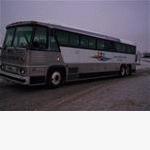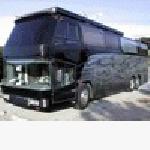| Author | Message | ||
| Terry (T3rry)
Registered Member Username: T3rry Post Number: 6 Registered: 2-2010 Posted From: 209.167.172.135  Rating: N/A |
OK, so i might be totally off here and asking the stupidest question ever, but i am going to ask it anyways, i am looking at getting about a 3k inverter to use ont he 24v system (probably 4x8D) can i hook up 2 1500w 12v inverters in series and have them work fine? (i figure, it works for light bulbs, why not inverters?) | ||
| Sean Welsh (Sean)
Registered Member Username: Sean Post Number: 1014 Registered: 1-2003 Posted From: 72.171.0.149  Rating: |
No. In order to use multiple inverters to provide a higher amount of power to a single output, you need to use special inverters that are made to do this. This is called "stacking." The inverters must communicate with each other over a special "stacking cable" (usually an optional extra-cost part) in order to synchronize their outputs. The inverters also need to be programmed for this purpose; some can be programmed directly from the front panel, but others required optional extra-cost remote panels for programming. Generally these features are only found on expensive high-end inverters in the first place. It will be cheaper (and easier) to just buy a 3kW unit than to try to parallel two 1.5kW units (if you could even find such a small inverter with stacking capability). Even if you do not care about stacking the outputs, you can't simply divide the 24 volt battery input in two by wiring the inverters in series. That only works with devices that draw exactly the same amount of current at all times. In your light bulb example, you can wire two 10-watt, 12v bulbs in series and connect them to 24v, but if you wired a 10-watt bulb in series with a 20-watt bulb, it wouldn't work -- one bulb would burn out in a blaze of glory. Inverters draw different amounts of current depending on load; the instant one drew more or less current than the other, one of them would blow. -Sean http://OurOdyssey.BlogSpot.com (Message edited by Sean on March 01, 2010) | ||
| Terry (T3rry)
Registered Member Username: T3rry Post Number: 7 Registered: 2-2010 Posted From: 209.167.172.135  Rating: N/A |
Thanks sean, that's the answer i expected... much appriciated. Is there a step down from 24 to 12 i could use that would be heavy duty enough for an inverter? (or perhaps an isolator and a step down with a separate 12v bank that could all be charged from the buses alternator? i really dont have a budget for a genset, or for a 24v inverter, and i also have some 12v appliances to run) i just find that 12v inverters can be had for a fraction of the cost of 24v. | ||
| Sean Welsh (Sean)
Registered Member Username: Sean Post Number: 1015 Registered: 1-2003 Posted From: 67.142.130.27  Rating: |
Again, no. If you have a 24-volt coach, you have to pay the piper one way or another. On the plus side, 24-volt systems are generally superior to 12-volt systems; I have written extensively about this here in the past. Your options are to get a 24-volt inverter, get a high-current "equalizer" which makes 12 volts from 24, or put a 12-volt alternator on the engine. Of these, just getting the 24-volt inverter is the easiest and least expensive. Remember that your 3kW of inverter capacity would require 275 amps of equalizer capacity, plus whatever is needed for the 12 volt loads. Since the largest equalizers are about 100 amps (12-volt output), you'd need three of them. Or, for 3kW of 12-volt inverter capacity, you'd need a 275-amp alternator; that would be a big 50DN oil cooled, or similar. Big bucks to buy and figure out how to install (probably best to change the existing alternator for a 12-volt, then throw a smaller 24-volt belt-drive on there for chassis loads). By contrast, a 24-volt inverter in that rating will probably only cost you an extra 20% over a 12-volt model. -Sean http://OurOdyssey.BlogSpot.com | ||
| Terry (T3rry)
Registered Member Username: T3rry Post Number: 15 Registered: 2-2010 Posted From: 209.167.172.135  Rating: N/A |
Thanks Sean, Looking at 24v inverters, they're not as unreasonably priced as i first thought, (i found a site where i could get a 2300watt (4600 peak) for under $300, which should suffice for our usage. thanks for the suggestion and information | ||
| les marston (Les_marston)
Registered Member Username: Les_marston Post Number: 15 Registered: 1-2010 Posted From: 68.151.248.141 Rating: N/A |
Hey Sean On this topic if I could also ask a question? I have an older Trace 24 volt converter/ inverter that I want to incorporate into the newer coach and so will be running a 24 volt set of house batteries. The question is will this high current equalizer, That you speak of, work to also charge a separate 12 volt bank of batteries for the 12 volt lights and appliances? Or would I be better to put in a separate 12 volt alternator? or can I run a normal load of 12 volt lights etc off of the equalizer from the 24 volt bank of batteries? Les P.S. Ordered "Designing Electrical Layouts" book from George Myers as you suggested.. Looking forward to getting it. Les | ||
| Sean Welsh (Sean)
Registered Member Username: Sean Post Number: 1017 Registered: 1-2003 Posted From: 72.171.0.142  Rating: N/A |
Les, Typically, 12-volt loads are run from the "center tap" of a 24-volt bank, and an equalizer is used to keep the "upper" and "lower" halves of the bank evenly loaded or charged. -Sean http://OurOdyssey.BlogSpot.com | ||
| Terry (T3rry)
Registered Member Username: T3rry Post Number: 18 Registered: 2-2010 Posted From: 209.167.172.135  Rating: N/A |
Les, i found this site http://bus.getdave.com/Docs/12Von24V/ it explains how to take advantage of 12v from a 24v system. | ||
| FAST FRED (Fast_fred)
Registered Member Username: Fast_fred Post Number: 1100 Registered: 10-2006 Posted From: 69.19.14.20  Rating: N/A |
I'm into belt and suspenders so we can repair a flaw at our leisure , rather than at the truck stop bandit shop. The DD Ser: 50 will run its stock 24V alt to keep up the start batts. A large frame truck alt will run the 12V coach. A salvaged from the donor 60A converter will operate the 12v FROM 24 should the 12v alt fail. TO get 24V from 12V the only option seems to be an inverter running a 24V battery charger, any other ideas? FF | ||
| Jim Wilke (Jim Bob) (Pd41044039)
Registered Member Username: Pd41044039 Post Number: 453 Registered: 2-2001 Posted From: 74.143.99.106 Rating: N/A |
Ahh, Fred. I'm very much in agreement with you. My motto is "Redundancy is the difference between an inconvenience and an emergency." I have had a number of systems fail for reasons like bad fuel, failed components, even ice. Being able to switch to different power sources, or use 2 of 3 remaining air conditioners allows you to continue on your way in relative comfort and deal with the problem in a secure, non stressful place. |